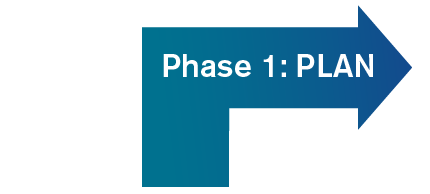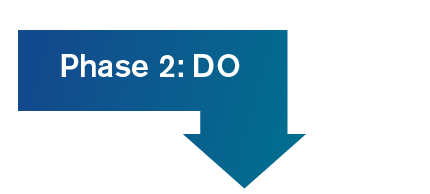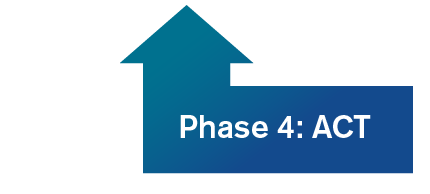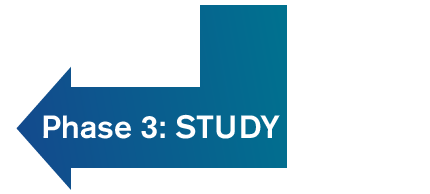
Self-Study and the Accreditation Site Visit
Overview
For programs on Continued Accreditation, the Self-Study is conducted approximately every seven years. Approximately 18 to 24 months following completion of the Self-Study, programs will have a full accreditation site visit to evaluate compliance with the ACGME-I Foundational and Advanced Specialty Requirements. No Program Application is required for the accreditation site visit. As the visit is based on information about the program collected over the previous accreditation period, including through Resident/Fellow and Faculty Surveys, Annual Updates, program changes, and, if applicable, the program’s response to citations.
A residency and its affiliated fellowship programs should collaborate on developing their Self-Studies, and will be evaluated together at the time of the accreditation site visit.
The model depicts how the Self-Study must be developed within the context of the program’s mission and aims. The phases are similar to the quality improvement cycle of PLAN, DO, STUDY, and ACT.
Program Mission and Aims
Fundamental to the Self-Study process are the program’s mission and aims. Although all programs must adhere to the ACGME-I Foundational and Advanced Specialty Requirements, ACGME-I recognizes that within this framework, programs may place different emphasis on areas such as research, leadership, public health, etc. that coincide with the mission of the Sponsoring Institution and best meets the needs of the community it serves and the program’s graduates.
The program’s aims are based on the mission and are the key expectations for the program. For example, aims may focus on the type of residents or fellows recruited by the program, or on preparing graduates for particular careers such as clinical practice, academics, research, or primary care. Aims might also include care for underserved patients, health policy or advocacy, population health, or generating new knowledge. When developing the program’s mission and aims, consider program and institutional values in areas such as quality and safety, team-based care, resident well-being, and promotion of professionalism in residents/fellows and faculty members. Although aims may change, they should be developed by taking a long-term strategic view. In some institutions, setting program aims will be an institution-wide initiative.
Self-Study
The Self-Study is based on the program’s mission and aims and the Annual Program Evaluation. Using the quality improvement cycle of PLAN, DO, STUDY, and ACT, the Self- Study process requires the program to conduct a longitudinal view of program quality. A summary of the Self-Study is submitted to ACGME-I on a date indicated in the Accreditation Data System (ADS). Approximately 18 to 24 months later, a comprehensive site visit occurs. The program is then reviewed at the next Review Committee-International meeting.
Resource
High-Value Data Suggested for Use in Program Evaluation and Improvement




